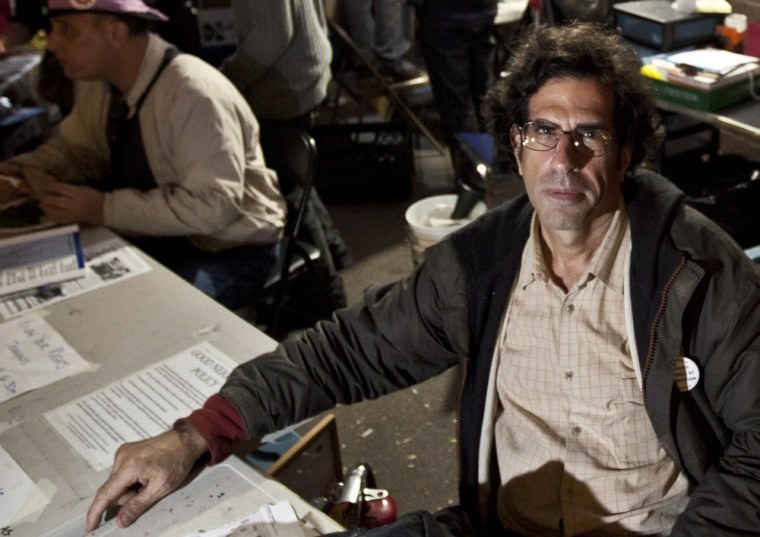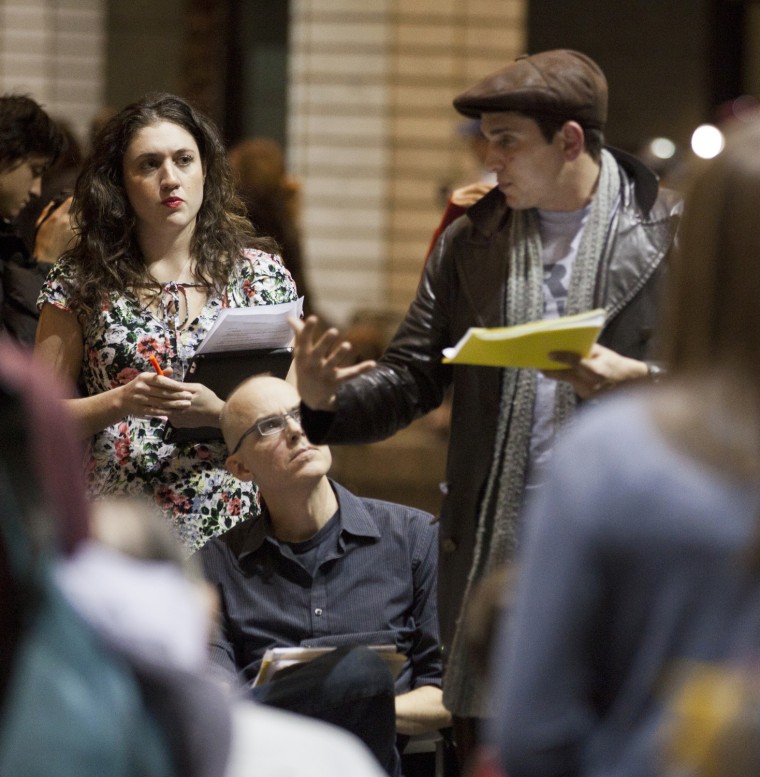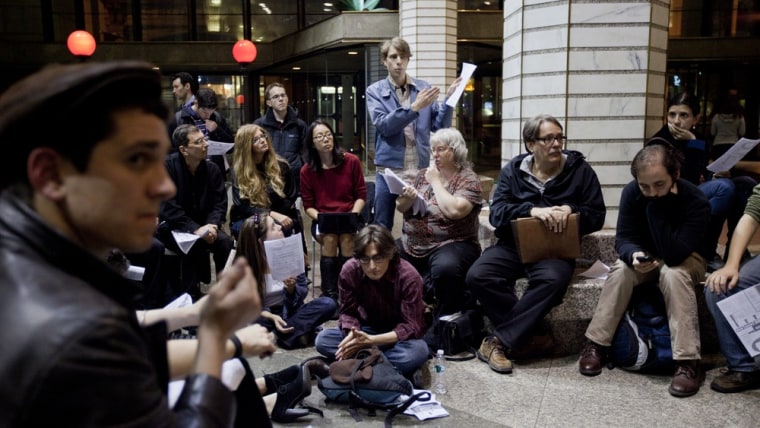As the "Occupy Wall Street" protest enters its third month, members are wrestling with an issue as old as the Athenians who first hatched the idea of democracy around 500 B.C.: Should we issue a set of demands and, if so, what should they be?
The debate has taken on new meaning with this week’s removal of the protest camp at Zuccotti Park. Some in the flagship occupation in the heart of America’s financial sector believe the police action provided them with the perfect moment to put forward specific demands and build support among the so-called “99 percent” of Americans outside the economic elite.
But opponents argue that not making demands will strengthen the “Occupy” cause by keeping all options on the table, including the sort of systematic changes that they believe are needed to address the economic inequalities that are at the core of their anger.

“The push for demands has generated a lot of controversy; there are ardent supporters and there are ardent opponents,” said Bill Dobbs, a member of the movement’s public relations working group. “In all these discussions about demands (the central issue) is, ‘Where … should this movement go?’”
A “Principles of Solidarity” statement accepted by the protest’s general assembly on Sept. 23 – six days after protesters set up camp near Wall Street -- promised that “demands will follow.”
Just over a week later, the demands working group – one of more than 80 groups formed to tackle topics like alternative currencies, political and electoral reform, trade justice and tactics – began trying to come up with some specific aims.
From the beginning, coming up with demands capable of winning the support of a vast majority of the protesters proved problematic. Minutes of the group’s meetings over the past month and a half chronicle the discord that the effort has generated.
Opponents have accused the group, which has some 250 members online and a few dozen who meet in person, of going against the principles of the “Occupy” movement. Some issued their own demand, calling on the group to merge with another one better aligned with their vision — or even disband.
"Inherently, in asking for demands, you are accepting that there is a power greater than yourself, which is something that this movement is categorically against," Patrick Bruner, a 23-year-old protester, told the group. "This movement is founded on autonomous action and collective wisdom."
Some members of the demands group said they welcomed the dissent and asked questions. But others saw it as a calculated effort to disrupt the process.
"If you don't want to make demands, what do you wish?" asked Alvin Rodriguez, a 55-year-old personal trainer from the Bronx, rejecting Bruner's suggestion that the group had created hierarchy in the leaderless movement. "There is a financial system that is in the process of disintegrating on all of us. It is hopelessly bankrupt and brutal austerity measures are in place right now, and you don't want to make demands? ... It's not a hierarchy, it's called leadership, and why don't you join us in that leadership to form those demands so we might take back our government of the people."
'Jobs for All'
The group’s early efforts resulted in a draft “Jobs for All” demand, which was presented to the general assembly for discussion more than a week ago. Here’s how it went:
Members of the demands group distributed copies of the draft and read it out loud. Breakout discussion groups were held, with a member from the group sitting in on each one. At the end, each demands' member reported back to the general assembly what their breakout circle had talked about.
Some of the dozens of other protesters in attendance backed the jobs demand, while others suggested revisions or their own alternatives. One man handed out fliers about his idea for a constitutional amendment to specify that corporations aren’t people and money is not speech.
“My major concern for the longevity of the movement is essentially making something that becomes divisive … I agree with a lot of these things (in the plan), on different time scales though,” said the protester, Edward T. Hall III, who also proposed turning the demand into a question. “We want to create dialogue instead of create a focal point of criticism.”
Members of the demands group agreed to work on it some more. At a three-hour meeting last week, they refined the original proposal, then began approaching other working groups to get their support.
The eviction of the protesters Monday night slowed the process, but it also provided a new impetus to act, said members of the group who joined several hundreds of others at the first general assembly since the camp removal on late Tuesday under golden-leafed trees in Zuccotti Park.
Cecily McMillan, a graduate student in liberal studies who is part of the demands group, said she felt there was no better time for the movement to say what it wants.

“We no longer have a central … organized space so we need a demand to carry on like what kind of the symbolism of the park once did to some degree. It’s really got to go to the community now,” said McMillan, 23, who also is northeast regional organizer for the Democratic Socialists of America.
'The state is powerful'
“The eviction last night is very much the point … the state is powerful ,” said Peter Queck, 28, a member of the working group who is unemployed. “To expand the movement, we need to reach out to more and more of the 99 percent … to people who are on the sidelines trying to wait for something more concrete. … Demands I think, still play an integral part of that.”
But Bruner, one of the critics of the effort to crystalize demands, said doing so would immediately narrow the possibilities of what the “Occupy” movement could achieve.
“My reasoning was that … we had successfully changed the conversation enough that people were going to listen to all of the things that we had to say,” he said Wednesday. Issuing demands “boils us down to a problem with a few things, but this isn't a problem with a few things, and everyone knows it. And after seeing the events of this last week with a coordinated national effort to crackdown on us ... it's obvious that the problem isn't (the) pieces of the system. It's obvious that the problem is the system and that's what we're talking about, we're talking about all of the ways in which the system is broken."
A common set of demands
Gary Gerstle, a professor of American history at Vanderbilt University and an expert in social movements, said that while it was important for the protesters to "let things emerge," they'll need to issue a common set of demands "that different groups are going to be able to unite around and also at the same time allows them to pursue their local interests."
"There has to be a big demand that addresses the central issue of inequality, of suffering and opportunity, the 99 percent versus the 1 percent,” he said. “How does that get concretized in a real issue that really has legs and can really change the face of politics?”
He said the authorities may have done the protesters a favor with the eviction, because the latter didn’t appear to have a “clear strategy” for moving to the second stage of their protest.
“Occupation is no long enough; OWS will need to decide whether it wants to play a “Tea Party” role in American politics, perching itself to the left of the Democratic Party, and through its passion, mobilization, and demands, shaking up the center of politics and pulling it to the left,” he said in an email to msnbc.com. Or, “they could … (seek) to spread their principles through existing institutions (labor unions, NGOs, etc.) and build up new institutions that fully embody their principles, while seeking new ways of capturing the popular imagination through street protests, media interventions and cultural manifestoes.”
A number of the protesters who don’t support demands see the movement’s physical encampments as success in itself, noting that they have created a space for open dialogue across a broad swath of social and economic classes and age groups.
Jennifer Klein, a professor of 20th century U.S. history at Yale University, said that the occupation strategy had served the protest well in the movement’s early days.
“There has been so much obfuscation of elite class power in the U.S. for the last three decades that taking over those spaces … and challenging the class and spatial boundaries of the city, is really a good starting point,” she said.
But she, too, said that the time has come for the protesters to explain what they want.
“I think it's time to think big,” she said. “What is the point of thinking in terms of, ‘If we could just come up with this one little bill’? I just think lobbyists will so easily outmaneuver them.”
But Bruner is not persuaded. Despite the loss of the tent camp, he said that the movement should continue to carve out spaces where individual voices can be heard, rather than trying to meld them into a chorus.
“Creating a civic space where actual democratic discussion is possible has been central to our movement and will continue to be so,” he said. “It's obvious that in our society unless we make spaces for real and meaningful conversation, that those conversations won't happen, so occupying a space is certainly on the forefront of most of our minds.”
